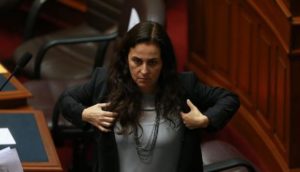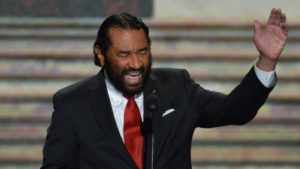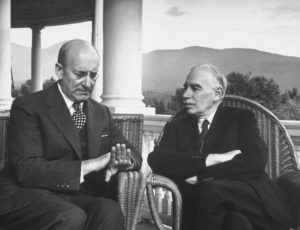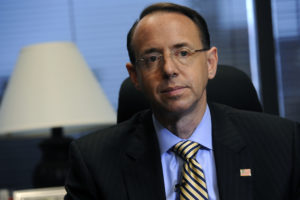La titular del Minsa se defiende de las críticas y afirma que en su cartera se están haciendo cambios que generan ruido. Además, pide que Ejecutivo y Congreso trabajen juntos

La ministra Patricia García afirma que en su sector se está confrontando contra la corrupción y los hechos que van en contra de las políticas públicas. (Foto: Lino Chipana / Archivo El Comercio)
Patricia García se ubica en medio de varios frentes de controversia. La crisis del dengue –debido a El Niño costero–, los problemas con el Sistema Integral de Salud (SIS) y los cuestionamientos de algunos gremios médicos a su gestión podrían derivar en una interpelación. Ella, de forma cuidadosa, responde.
La epidemia del dengue derivó en una gran controversia, la cual alcanzó incluso ribetes políticos. ¿Cuál es la situación actual del problema?
Tuvimos una epidemia en todo el norte y sobre todo en Piura, pero en este momento el número de casos está disminuyendo. Esperamos mantener esa tendencia, aunque no podemos bajar la guardia. Nosotros actuamos desde el inicio. Declaramos la emergencia sanitaria, transferimos dinero a las regiones [afectadas] y elaboramos un plan para identificar de dónde provenían los casos. Sacamos un decreto de urgencia para que los pacientes afectados fueran atendidos de forma gratuita e implementamos pruebas rápidas para detectar la enfermedad.
El problema se arrastra desde hace años. ¿Es imposible erradicarlo?
La palabra ‘erradicación’ no se usa hoy en la salud pública. No tenemos cura para el problema. Lo que podemos hacer es controlarlo con miras a intentar, en un futuro, eliminarlo. Para ello, es necesario trabajar de manera conjunta desde el Minsa, los gobiernos regionales y locales y, sobre todo, la comunidad. Acá la gente almacena agua por todas partes. Tenemos que enseñar a las personas cómo hacerlo sin fomentar la reproducción del zancudo. Cuando ya lo sepan, habrá policías de salud pública que pondrán multas si encuentran criaderos o si no se permite ingresar a las casas.
¿Se arrepiente de haber dicho que se estaba creando un psicosocial en torno al dengue?
Lo que lamento es que se me haya malinterpretado. Yo sé de qué trata el dengue y cómo la gente sufre. Me refería exclusivamente a que no existía una pandemia. Tal vez, por mi tecnicismo, no me hice entender.
En el 2017, el presupuesto inicial para reducción de la vulnerabilidad ante desastres –pliego 068– del sector Salud fue el menor de los últimos cinco años. ¿Esto dificultó el trabajo del Minsa en la emergencia?
Creo que hay otras cosas que dificultaron la tarea. En Piura era muy difícil fumigar casas ya que se mantenían inundadas por mucho tiempo. Además, si bien se suponía que las regiones tenían termonebulizadores [para fumigar], muchos de ellos no funcionaban. Y la gente, como no sabía bien qué sucedía, no nos dejaba ingresar.
Esta reducción de presupuesto podría tomarse como una falta de prevención.
Creo que hubo otras cuestiones, pero ahora tenemos que hacer un sinceramiento y no solo del presupuesto de emergencia. Por ejemplo, cada región recibió a inicios de año una partida de dinero especialmente destinada al control de enfermedades transmitidas por vectores [personas infectadas] y no se ejecutó como debería. Una lección aprendida es que debemos tener presupuestos protegidos para este tipo de problemas. En julio nos sentaremos con los representantes de las regiones para hacer un plan de acción concertado.
Algunos miembros de la oposición afirman que existió una inacción del Minsa ante la emergencia y han anunciado una posible interpelación. ¿Cómo toma esto?
Con calma. Siempre voy a estar lista para asistir al Congreso a responder las preguntas que sean necesarias y contar lo que estamos haciendo.
¿Considera que el pedido sería justo o injusto?
Prefiero no hacer juicios de valor al respecto. El Congreso tiene funciones específicas. Cada vez que me citen, responderé sus preguntas. Lo que sí hago es un llamado para trabajar juntos [Congreso y Ejecutivo] y no solo cuando haya desastres, sino en todo momento porque el país lo necesita. En la emergencia demostramos que no había colores políticos. Ojalá pudiéramos trabajar así siempre.
¿Ejecutivo y Congreso pueden trabajar juntos en el actual ambiente de crispación?
Yo creo que sí. Deberíamos hacerlo.
Si bien dice estar actuando frente a los problemas, algunos parlamentarios opositores señalan que el sector Salud “está abandonado”.
Me llama la atención que todo este revuelo no haya existido antes de julio. Cuando entramos a la cartera hallamos un desabastecimiento impresionante, desmotivación del personal y mucha corrupción dentro del sector. Sin embargo, se están dando cambios. Por ejemplo, hemos hecho cinco licitaciones de medicamentos por 800 millones de soles. En los últimos dos años no se hizo ni una. El problema es que, una vez que compramos, se encuentran cuellos de botella en la distribución o en la prescripción.
¿El SIS se ha convertido en un emblema de los problemas descritos?
El SIS es una herramienta importante para dar cobertura universal, pero hemos encontrado una serie de anomalías. No puede ser que el dinero del Estado se use de forma incorrecta y no llegue a todos. Por ejemplo, se estaba aprovechando la ley de emergencia para direccionar una porción importante del dinero a clínicas privadas y no para cubrir situaciones reales de emergencia. Ya tenemos tres informes de la oficina de control interno y seis en camino. Muchos casos llegarán hasta las procuradurías u otros niveles.
El ex jefe del SIS Edmundo Beteta fue uno de los encargados de identificar esos problemas. ¿Por qué se le pidió la renuncia?
Reconozco su trabajo al identificar varias de estas cosas, pero en este momento necesitábamos una mayor velocidad para hacer la implementación de varios de los aspectos recomendados por la comisión reorganizadora del SIS. Seguiremos luchando contra la corrupción, pero necesitábamos hacer un cambio de timón. Además, algunos conflictos con los hospitales condicionaron la decisión.

Algunos toman ese cambio de timón como una muestra de debilidad ante el gremio médico.
Prefiero no opinar al respecto. Yo me estoy confrontando directamente contra la corrupción y contra los hechos que van en contra de las políticas públicas. Ahora yo le estoy diciendo a todo el mundo que se vacune contra la influenza. Si por alguna razón alguien les dice que no tienen vacunas o que no pueden vacunar, deben denunciarlo. Estamos recibiendo estos avisos y realizando como 47 auditorías completas a diferentes aspectos del Minsa.
¿Garantiza que la reforma continuará?
Vamos a continuar, pero los tiempos son importantes. Lo clave es hacer la reorganización y actuar contra la corrupción, pero sin dejar de dar el servicio al ciudadano.
¿Cómo se pagarán los 700 millones de deuda que mantiene el SIS?
La deuda está siendo auditada. Estamos trabajando con el MEF para pagar las deudas en función a las deudas específicas de cada hospital.
¿El Congreso se equivocó al derogar el D. Leg. que incorporaba el INEN (Instituto Nacional de Enfermedades Neoplásicas) a su cartera?
Yo no soy quién para decir si se equivocó o no, pero lo seguiremos intentando. Hoy el INEN es autónomo. Sabemos que hay muchas falencias y nosotros, como ente rector, queremos subsanarlas. Hemos mandado a la Superintendencia Nacional de Salud (SuSalud) para averiguar por qué no hay medicamentos.
¿En el INEN también hay corrupción?
En todo el sector Salud, lamentablemente, tenemos corrupción enquistada a todo nivel y hay que erradicarla. Aunque, claro, no todos son corruptos.
Existen gremios que piden su renuncia. ¿Qué les diría?
Nada. Estamos haciendo muchos cambios. Eso obviamente genera que algunas personas no estén muy contentas y por eso se genera todo este ruido. Pero es parte de la función.
En: elcomercio










